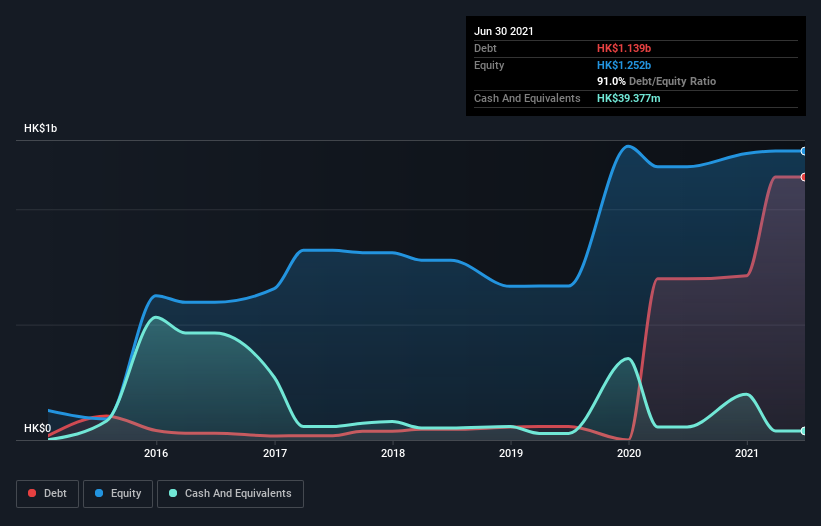- Hong Kong
- /
- Retail Distributors
- /
- SEHK:620
DTXS Silk Road Investment Holdings (HKG:620) Seems To Use Debt Quite Sensibly

Howard Marks put it nicely when he said that, rather than worrying about share price volatility, 'The possibility of permanent loss is the risk I worry about... and every practical investor I know worries about.' So it might be obvious that you need to consider debt, when you think about how risky any given stock is, because too much debt can sink a company. Importantly, DTXS Silk Road Investment Holdings Company Limited (HKG:620) does carry debt. But the more important question is: how much risk is that debt creating?
When Is Debt Dangerous?
Generally speaking, debt only becomes a real problem when a company can't easily pay it off, either by raising capital or with its own cash flow. In the worst case scenario, a company can go bankrupt if it cannot pay its creditors. However, a more usual (but still expensive) situation is where a company must dilute shareholders at a cheap share price simply to get debt under control. Of course, debt can be an important tool in businesses, particularly capital heavy businesses. The first step when considering a company's debt levels is to consider its cash and debt together.
See our latest analysis for DTXS Silk Road Investment Holdings
What Is DTXS Silk Road Investment Holdings's Debt?
As you can see below, at the end of June 2021, DTXS Silk Road Investment Holdings had HK$1.14b of debt, up from HK$698.4m a year ago. Click the image for more detail. However, because it has a cash reserve of HK$39.4m, its net debt is less, at about HK$1.10b.

How Strong Is DTXS Silk Road Investment Holdings' Balance Sheet?
Zooming in on the latest balance sheet data, we can see that DTXS Silk Road Investment Holdings had liabilities of HK$1.22b due within 12 months and liabilities of HK$431.9m due beyond that. Offsetting this, it had HK$39.4m in cash and HK$1.16b in receivables that were due within 12 months. So it has liabilities totalling HK$452.2m more than its cash and near-term receivables, combined.
Since publicly traded DTXS Silk Road Investment Holdings shares are worth a total of HK$2.86b, it seems unlikely that this level of liabilities would be a major threat. But there are sufficient liabilities that we would certainly recommend shareholders continue to monitor the balance sheet, going forward.
In order to size up a company's debt relative to its earnings, we calculate its net debt divided by its earnings before interest, tax, depreciation, and amortization (EBITDA) and its earnings before interest and tax (EBIT) divided by its interest expense (its interest cover). This way, we consider both the absolute quantum of the debt, as well as the interest rates paid on it.
As it happens DTXS Silk Road Investment Holdings has a fairly concerning net debt to EBITDA ratio of 46.6 but very strong interest coverage of 1k. This means that unless the company has access to very cheap debt, that interest expense will likely grow in the future. Notably, DTXS Silk Road Investment Holdings's EBIT launched higher than Elon Musk, gaining a whopping 120% on last year. When analysing debt levels, the balance sheet is the obvious place to start. But you can't view debt in total isolation; since DTXS Silk Road Investment Holdings will need earnings to service that debt. So if you're keen to discover more about its earnings, it might be worth checking out this graph of its long term earnings trend.
Finally, a company can only pay off debt with cold hard cash, not accounting profits. So the logical step is to look at the proportion of that EBIT that is matched by actual free cash flow. Over the last two years, DTXS Silk Road Investment Holdings saw substantial negative free cash flow, in total. While that may be a result of expenditure for growth, it does make the debt far more risky.
Our View
We weren't impressed with DTXS Silk Road Investment Holdings's net debt to EBITDA, and its conversion of EBIT to free cash flow made us cautious. But like a ballerina ending on a perfect pirouette, it has not trouble covering its interest expense with its EBIT. When we consider all the factors mentioned above, we do feel a bit cautious about DTXS Silk Road Investment Holdings's use of debt. While debt does have its upside in higher potential returns, we think shareholders should definitely consider how debt levels might make the stock more risky. When analysing debt levels, the balance sheet is the obvious place to start. However, not all investment risk resides within the balance sheet - far from it. Case in point: We've spotted 3 warning signs for DTXS Silk Road Investment Holdings you should be aware of, and 2 of them shouldn't be ignored.
Of course, if you're the type of investor who prefers buying stocks without the burden of debt, then don't hesitate to discover our exclusive list of net cash growth stocks, today.
New: Manage All Your Stock Portfolios in One Place
We've created the ultimate portfolio companion for stock investors, and it's free.
• Connect an unlimited number of Portfolios and see your total in one currency
• Be alerted to new Warning Signs or Risks via email or mobile
• Track the Fair Value of your stocks
This article by Simply Wall St is general in nature. We provide commentary based on historical data and analyst forecasts only using an unbiased methodology and our articles are not intended to be financial advice. It does not constitute a recommendation to buy or sell any stock, and does not take account of your objectives, or your financial situation. We aim to bring you long-term focused analysis driven by fundamental data. Note that our analysis may not factor in the latest price-sensitive company announcements or qualitative material. Simply Wall St has no position in any stocks mentioned.
Have feedback on this article? Concerned about the content? Get in touch with us directly. Alternatively, email editorial-team (at) simplywallst.com.
About SEHK:620
DTXS Silk Road Investment Holdings
An investment holding company, engages in the arts and collections, auction, vineyard, and merchandise trading businesses in Hong Kong, Mainland China, and France.
Slightly overvalued with imperfect balance sheet.
Similar Companies
Market Insights
Community Narratives



